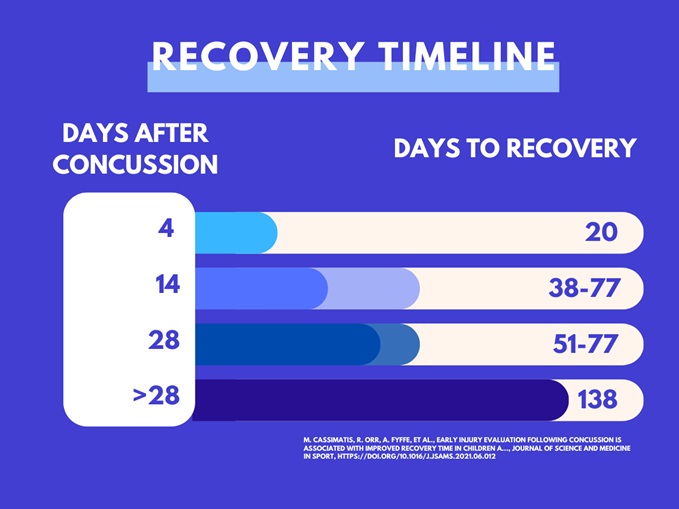How Timing and the Provider You See Affect Your Recovery Timeline
Concussions are a common injury in children and adolescents, often occurring during sports and recreational activities. While concussions are typically considered mild traumatic brain injuries, their effects can be long-lasting and potentially debilitating. Recent research has shed light on the critical role of early evaluation by a concussion specialist in speeding up recovery and reducing the risk of prolonged symptoms. In this article, we will explore two key studies that establish the importance of seeking specialized care promptly after a concussion.
Study 1: The Sooner, the Better
A study in the Journal of Science and Medicine in Sport reveals a direct link between the timing of evaluation and recovery time. The study found that delayed evaluation and a high initial symptom burden during the first clinic visit were significant factors in predicting prolonged concussion recovery, defined as lasting more than 28 days. The research showed that children who received specialist care within 28 days of their concussion demonstrated significantly faster recovery times compared to those who sought care after this critical time frame. In fact, even a seemingly short delay in evaluation resulted in a threefold increase in recovery time.

The chart above shows the different recovery timelines for athletes based on the number of days between their concussion and when they sought professional help. This study found that immediately seeking help within 4 days of concussion led to a 20-day recovery timeline. That’s pretty good, considering that the average recovery timeline for youth athletes with sports-related concussion is about 28 days. A delay of 14 days between concussion and seeking help can extend recovery from 20 days to anywhere between 38 and 77 days. Wait another 14 days and recovery can be prolonged by up to nearly 5 months.
Study 2: Symptom Severity and Early Specialist Visits
Another study in Applied Neuropsychology: Child reinforces the importance of early evaluation by a concussion specialist. This study used logistic regression to identify the main predictors of recovery time. The researchers found that two primary factors played a pivotal role in determining the duration of recovery: the average symptom severity during the first visit and the time to the first clinical visit. The research indicated that higher symptom severity and delayed visits to a specialist were the most significant contributors to prolonged recovery. In fact, the time to the first clinical visit was found to be a fivefold predictor of recovery time.
Key Takeaway: The Value of Early Specialist Care
With their combined insights, these two studies highlight the importance of seeking the expertise of a concussion specialist as soon as possible after concussion. Doing so significantly improves the chances of a swift and complete recovery. The studies suggest that focusing on symptom severity and early clinical visits is more informative than merely counting the number of symptoms or assessing their overall severity. Early intervention not only accelerates the recovery process but also reduces the risk of prolonged symptoms and complications.
Parents, coaches, and healthcare providers should be aware of these findings and prioritize early evaluation by concussion specialists when dealing with these injuries in young individuals. Children and adolescents are particularly vulnerable to the effects of concussions, and their developing brains require specialized care. By taking immediate action and seeking expert guidance, we can provide our young athletes with the best possible chance for a full and timely recovery.
Time and Objective Data Are of the Essence
How quickly help is sought directly impacts how quickly our athletes recover. Early evaluation by a concussion specialist can make all the difference in ensuring the well-being and future health of our youth athletes. As current research makes clear, this evaluation should include symptoms and objective data including the athlete’s neurocognitive and neuromotor function. Seeking expert care to evaluate objective functional measures at the earliest sign of a concussion helps our athletes get back to their normal activities faster while minimizing the potential long-term consequences.
**FREE BONUS**
In both of the studies discussed above, the researchers used the Post-Concussion Symptom Scale (PCSS) to measure the athlete’s symptom severity. You can get a free copy of the PCSS here to learn more about this concussion tool. If you’ve recently been concussed or are still experiencing lingering symptoms, schedule an assessment and treatment with Jackupuncture.
References
Study 1: M. Cassimatis, R. Orr, A. Fyffe, et al. Early injury evaluation following concussion is associated with improved recovery time in children and adolescents, Journal of Science and Medicine in Sport, https://doi.org/10.1016/j.jsams.2021.06.012.
Study 2: Claire L. Kowalczyk, Shawn R. Eagle, Cyndi L. Holland, Michael W. Collins & Anthony P. Kontos (2020): Average symptom severity and related predictors of prolonged recovery in pediatric patients with concussion, Applied Neuropsychology: Child, DOI: 10.1080/21622965.2020.1774376.

